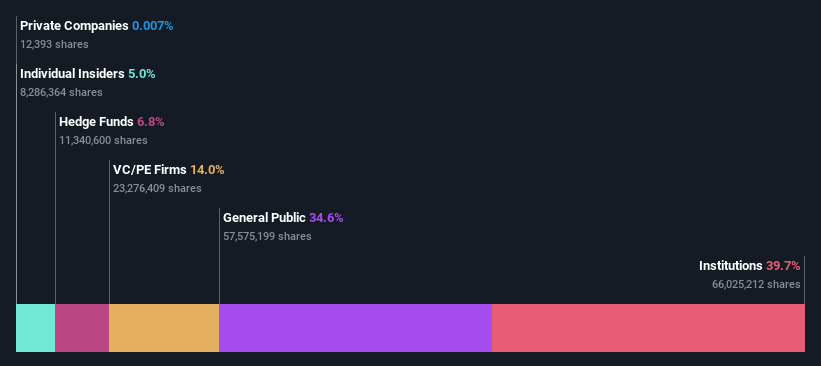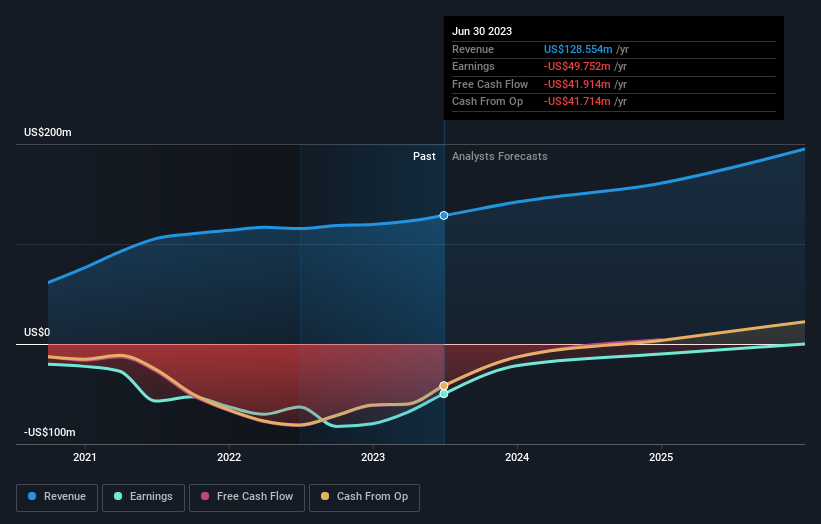- United States
- /
- Healthcare Services
- /
- NasdaqCM:TALK
Institutional investors control 40% of Talkspace, Inc. (NASDAQ:TALK) and were rewarded last week after stock increased 10%

Key Insights
- Significantly high institutional ownership implies Talkspace's stock price is sensitive to their trading actions
- The top 11 shareholders own 51% of the company
- Analyst forecasts along with ownership data serve to give a strong idea about prospects for a business
A look at the shareholders of Talkspace, Inc. (NASDAQ:TALK) can tell us which group is most powerful. With 40% stake, institutions possess the maximum shares in the company. Put another way, the group faces the maximum upside potential (or downside risk).
And last week, institutional investors ended up benefitting the most after the company hit US$291m in market cap. The gains from last week would have further boosted the one-year return to shareholders which currently stand at 72%.
In the chart below, we zoom in on the different ownership groups of Talkspace.
View our latest analysis for Talkspace

What Does The Institutional Ownership Tell Us About Talkspace?
Many institutions measure their performance against an index that approximates the local market. So they usually pay more attention to companies that are included in major indices.
We can see that Talkspace does have institutional investors; and they hold a good portion of the company's stock. This can indicate that the company has a certain degree of credibility in the investment community. However, it is best to be wary of relying on the supposed validation that comes with institutional investors. They too, get it wrong sometimes. If multiple institutions change their view on a stock at the same time, you could see the share price drop fast. It's therefore worth looking at Talkspace's earnings history below. Of course, the future is what really matters.

Our data indicates that hedge funds own 6.8% of Talkspace. That's interesting, because hedge funds can be quite active and activist. Many look for medium term catalysts that will drive the share price higher. The company's largest shareholder is NVP Associates, LLC, with ownership of 8.8%. With 6.8% and 5.1% of the shares outstanding respectively, Hudson Executive Capital LP and Qumra Capital are the second and third largest shareholders.
A closer look at our ownership figures suggests that the top 11 shareholders have a combined ownership of 51% implying that no single shareholder has a majority.
While studying institutional ownership for a company can add value to your research, it is also a good practice to research analyst recommendations to get a deeper understand of a stock's expected performance. Quite a few analysts cover the stock, so you could look into forecast growth quite easily.
Insider Ownership Of Talkspace
The definition of company insiders can be subjective and does vary between jurisdictions. Our data reflects individual insiders, capturing board members at the very least. The company management answer to the board and the latter should represent the interests of shareholders. Notably, sometimes top-level managers are on the board themselves.
Insider ownership is positive when it signals leadership are thinking like the true owners of the company. However, high insider ownership can also give immense power to a small group within the company. This can be negative in some circumstances.
Shareholders would probably be interested to learn that insiders own shares in Talkspace, Inc.. It has a market capitalization of just US$291m, and insiders have US$15m worth of shares, in their own names. This shows at least some alignment. You can click here to see if those insiders have been buying or selling.
General Public Ownership
With a 35% ownership, the general public, mostly comprising of individual investors, have some degree of sway over Talkspace. This size of ownership, while considerable, may not be enough to change company policy if the decision is not in sync with other large shareholders.
Private Equity Ownership
Private equity firms hold a 14% stake in Talkspace. This suggests they can be influential in key policy decisions. Some might like this, because private equity are sometimes activists who hold management accountable. But other times, private equity is selling out, having taking the company public.
Next Steps:
I find it very interesting to look at who exactly owns a company. But to truly gain insight, we need to consider other information, too. For instance, we've identified 1 warning sign for Talkspace that you should be aware of.
If you would prefer discover what analysts are predicting in terms of future growth, do not miss this free report on analyst forecasts.
NB: Figures in this article are calculated using data from the last twelve months, which refer to the 12-month period ending on the last date of the month the financial statement is dated. This may not be consistent with full year annual report figures.
If you're looking to trade Talkspace, open an account with the lowest-cost platform trusted by professionals, Interactive Brokers.
With clients in over 200 countries and territories, and access to 160 markets, IBKR lets you trade stocks, options, futures, forex, bonds and funds from a single integrated account.
Enjoy no hidden fees, no account minimums, and FX conversion rates as low as 0.03%, far better than what most brokers offer.
Sponsored ContentValuation is complex, but we're here to simplify it.
Discover if Talkspace might be undervalued or overvalued with our detailed analysis, featuring fair value estimates, potential risks, dividends, insider trades, and its financial condition.
Access Free AnalysisHave feedback on this article? Concerned about the content? Get in touch with us directly. Alternatively, email editorial-team (at) simplywallst.com.
This article by Simply Wall St is general in nature. We provide commentary based on historical data and analyst forecasts only using an unbiased methodology and our articles are not intended to be financial advice. It does not constitute a recommendation to buy or sell any stock, and does not take account of your objectives, or your financial situation. We aim to bring you long-term focused analysis driven by fundamental data. Note that our analysis may not factor in the latest price-sensitive company announcements or qualitative material. Simply Wall St has no position in any stocks mentioned.
About NasdaqCM:TALK
Talkspace
Operates as a virtual behavioral healthcare company that connects patients with licensed mental health providers in the United States.
Flawless balance sheet with reasonable growth potential.
Similar Companies
Market Insights
Community Narratives



